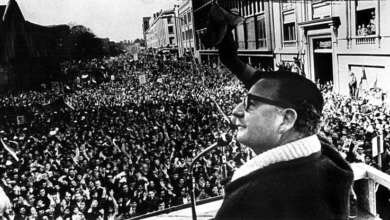The Dec. 6 Bolivian elections
resulted in a continued popular mandate for the progressive movement
represented by President Evo Morales. Morales was re-elected with 63 percent of
the vote. The Movement towards Socialism (MAS), Morales’ party, won two-thirds
of the seats in the Senate and Chamber of Deputies.
 Bolivian Indigenous occupy streets of La Paz in in support of new constitution approved by electorate Jan. 25, 2009. Photo: Virginio Sandy |
MAS won 25 of the 36 Senate seats
and 90 of the 130 deputies.
The legislative victories are significant, allowing the government to move
forward with important legislation and judicial appointments.
The vote for MAS also increased in
regions that have been dominated by the right-wing opposition, like the Santa Cruz,
Pando and Beni departments.
Evo Morales’ electoral performance
since his election four years ago has been remarkable. Whereas previous
successful candidates had usually scored below 25 percent of the popular vote, Morales won with 54 percent in 2005.
He was the first president over 20 years to have been accorded an absolute majority.
He was the first indigenous president in a country where more than 62 percent
of a population of 9 million is indigenous.
In July 2006, Morales won a
landslide victory that convened the Constituent
Assembly,
laying the institutional foundations of the future multinational state. In
August 2008, Evo won yet another important victory, with 67 percent of the
votes in a recall referendum on whether he and regional governors should stay
in office.
Finally, in January 2009, 61 percent of the voters approved the new
Constitution of the State.
What’s behind these remarkable electoral victories?
Evo Morales and the Movement
towards Socialism represent a popular current of change that is sweeping not
only Bolivia but Latin America as well. The majority of Bolivians, who live in
great poverty, now feel invested in a government that is making changes for the
better.
Since coming to office, the
Bolivian ruling class—supported by U.S. imperialism—has waged attack after
attack on Evo Morales and the Movement towards Socialism. Despite the violent
opposition of the Bolivian oligarchy, despite obstruction by the National
Electoral Court, attempts at coups, threats of secessionism and assassination
plans, despite the vicious hostility of the U.S. government, the people of
Bolivia have continued to fight for economic and social justice.
There are mainly four structural
changes promoted by the Morales’ administration that led to Evo’s victory in
last week’s elections:
The first one was the approval of
the Constituent Assembly and the creation of the new Political Constitution of
the State. The Constituent Assembly was an end result of the historical demand
put forward by indigenous people, farmers and workers of Bolivia, who had been
excluded from the political, economic, social and cultural life of the country.
By means of this popular democratic organ, they can now exercise their right to
decide the future of their country.
The new constitution represents a
resolute attempt to decolonize Bolivia and protect its territorial sovereignty.
It is an effort to guarantee the right to self-determination of the indigenous
nationalities, and at the same time, to stop the secessionist attempts of the
Bolivian oligarchy.
Second, the Morales government has
embarked on a series of transformations in the areas of production, consumption
and administration of natural and power resources to guarantee that the state
has more control over Bolivia’s natural wealth.
Third, Evo Morales has made land
reform a top priority in his efforts to overturn centuries of subjugation of
the indigenous people and poor peasants. The Morales administration has been
making more equitable land distribution, distributing
more than half a million acres to poor peasants during four years in office.
One of the main pillars of Morales’ political platform for the coming years is
the industrialization of Bolivia, a necessary step in its development.
Finally, the Morales’
administration has made a series of social reforms that benefit the majority of
the Bolivian population. The most important one was the campaign against illiteracy in
2008 made possible with Cuba’s aid through the program “Yo sí puedo”
(Yes, I can). Also, through solidarity from Cuba and Venezuela, hospitals and
medical centers have been built everywhere in the country.
The Dec. 6 electoral victory, as
Morales stated, “is not only a victory for Bolivia but for all the
anti-imperialist forces and governments and surely a source of inspiration,
teachings and a great stimulus to popular and indigenous movements in other
countries in the region.”
Within the context of Latin
America, Evo Morales has placed Bolivia with Venezuela, and Ecuador in the path
of building what is known as “Socialism of the 21st Century.” The political
movement seeks to integrate Latin America by means of ALBA; has a strong
anti-imperialist character and is creating the basis for a new class awareness
among the most exploited and oppressed. The development of popular, progressive
government in these countries is supported by mass movements and is marked by a
growing interest in the theory and practice of socialism.
Evo
Morales’ victory is a source of inspiration for struggling people around the world,
as more and more countries and movements stand against U.S. hegemony.






